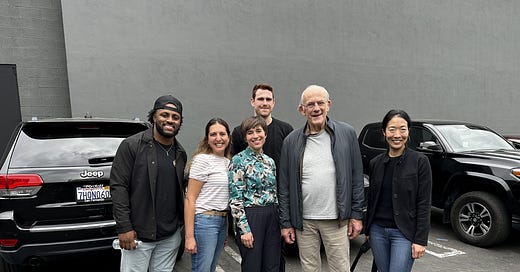A few weeks ago, I had the surreal experience of meeting Christopher Lloyd while filming the Gemini Developer Competition winner announcement in LA:
It was a whirlwind of a day, but one conversation in particular stuck with me. During a break in filming, a member of the production crew pulled me aside, curious about the current state of AI and eager to learn more about prompting. He was even taking a course on the topic!
It was refreshing to see someone in a traditionally non-tech role embrace AI and explore its potential applications in their field. It also brought to mind Ben Affleck's insightful comments about AI's impact on Hollywood. A few of his points particularly resonated with me.
The Importance of Taste
Affleck's observation that “AI cannot discern taste" highlights a crucial aspect of creativity: taste is a skill, one that's honed over time and varies greatly from person to person. While there are certainly ways to nudge AI towards a better understanding of "good taste" (through fine-tuning, clever prompting, and other emerging techniques), these methods still can't fully replicate the nuanced judgment of a truly talented individual – at least, not yet.
While AI excels at generating ideas, humans still play a crucial role in curating, refining, and ultimately choosing the best ones. This curation process is where experience and intuition play a vital role. A skilled creative professional, with years of experience and a finely tuned sense of what resonates with audiences, can sift through AI-generated options and identify the gems, the ideas with true potential. AI's current "taste" is limited by the data it's trained on, often reflecting the average quality of that data. This has two key implications:
Human creativity still holds an edge. A truly talented individual, with a unique creative vision, can often outperform AI in generating original and compelling work.
Humans are essential for navigating new creative frontiers. As new mediums and content formats emerge (think Instagram Reels, YouTube Shorts), humans will play a critical role in defining what makes them "good." Interestingly, these new formats will likely be both enabled by and built with AI, creating a symbiotic relationship between human and machine creativity.
Automating the Tedious, Unleashing the Creative
Affleck also noted that AI will automate the laborious and tedious aspects of filmmaking. This resonates deeply with my own experience and observations. I've often joked about a coworker who's systematically trying to replace herself with AI. In reality, she's simply becoming more productive by offloading repetitive tasks to her AI "direct report."
This echoes a popular sentiment I hear all the time: "AI won't replace [Product Managers], but [Product Managers] who know how to use AI will replace [Product Managers] who don’t." This applies across industries and roles, simply replace [Product Manager] with anything else: Engineers | Designers | Writers | Marketers… The key is not to fear AI, but to embrace it as a tool for augmentation, a way to free up our time and energy for more creative and strategic pursuits.
A Catalyst for Creative Abundance
Finally, Affleck's point about AI enabling more content to be made brings up interesting economic implications. The demand for good content isn't going away; if anything, it's likely to increase as AI allows for greater personalization and customization.
Imagine a future where AI generates countless spin-offs and alternate storylines based on popular franchises, tailored to individual viewer preferences. Think "fan fiction" on steroids, but with the production quality of a Hollywood studio. This could unlock entirely new revenue streams and transform the entertainment landscape as we know it.
The convergence of AI and creativity is still in its early stages, but the potential is immense. It's a time of both exciting possibilities and important questions. How will we navigate this new creative landscape? How will we define "good" in a world of AI-generated abundance? These are the questions that will shape the future of art, entertainment, and perhaps even the very nature of creativity itself.




